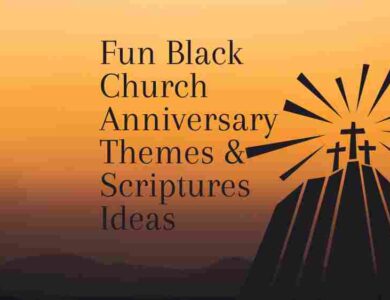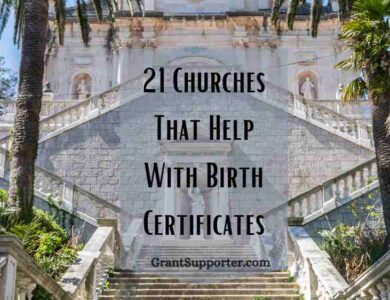6 Grants For Disabled Access To Churches: Easy Access
I have always loved visiting churches, not only for their spiritual significance but also for their architectural beauty and historical value. As a wheelchair user, I often face barriers and challenges in accessing these sacred spaces. That’s why I decided to come up with this post to share my experiences and insights on grants for disabled access to churches.
You’ll find different types of grants available, the eligibility criteria, the application process, and the benefits of improving accessibility for all.
Grants For Disabled Access To Churches
Grants for disabled access to churches are typically offered by government bodies, foundations, and religious organizations to help make church facilities more accessible to individuals with disabilities. Here’s a list of grants that can help you enhance the facilities at your church:

1. Christian Fund for the Disabled (CFD)
This matching grant program by Joni and Friends is designed to meet the practical needs of people with disabilities.
Who is assisted: Individuals, churches, or Christian organizations with requests reflecting a disability-related need
Type of Assistance: A one-time matching grant
Amount of funding offered: Up to $2,500
How To Apply: Visit their website, read the guidelines, and apply online
2. Disability Ministries of the United Methodist Church
This committee helps fund accessibility and inclusion projects specifically for United Methodist churches. They operate on an annual grant cycle, typically open from January to March.
Who is assisted: United Methodist Churches
Type of Assistance: Grants offering funds for facility enhancement
Amount of funding offered: Not mentioned
How To Apply: Visit their website, read the guidelines, and apply online
3. ELCA Disability Ministry Grants
The Evangelical Lutheran Church in America (ELCA) offers grants for inclusion and accessibility. Their program is open to congregations, synods, or other ELCA organizations, and the review team approves up to five grants.
Who is assisted: Congregations, synods, and other ELCA organizations
Type of Assistance: 5 Grants offering funds for facility enhancement
Amount of funding offered: Up to $10,000
How To Apply: Visit their website, read the guidelines, and apply online
4. Accessibility Grants from the United Methodist Church
Provided by the General Board of Global Ministries, these grants are part of a resolution adopted and readopted by The United Methodist Church to support accessibility in churches during their annual conferences.
Who is assisted: Congregations, synods, and other ELCA organizations
Type of Assistance: Small grants and larger one-time grants
Amount of funding offered: $500 – $1000 (small grants) and any amount requested and deemed eligible
How To Apply: Visit their website, read the guidelines, and apply online
5. People With Disabilities Foundation (PWDF)
The organization offers grants to nonprofit agencies to integrate people with psychiatric and/or developmental disabilities into the whole of society. This umbrella of grants also includes grants for disabled access to churches.
Who is assisted: Non-profits and churches
Type of Assistance: Small grants
Amount of funding offered: $5,000 to $12,500
How To Apply: Visit their website, read the guidelines, and apply online
6. Mustard Seed Foundation
This foundation provides matching grants for start-up projects of local churches, particularly in large urban centers. They focus on creative initiatives that demonstrate the love of Jesus in both word and action.
Who is assisted: Churches in Urban centers
Type of Assistance: Funds up to 50% of the total cost of a project
Amount of funding offered: Half of the entire project cost
How To Apply: Visit their website, read the guidelines, and apply online
Helping the churches become inclusive and accessible is a matter of great service. NGOs and government agencies administer this through their grant programs. These grant programs also include assistance with mortgages. You can seek help from them when you are facing a financial crisis.
How To Find The Right Grants For Disabled Access To Churches?
Finding the right grant, especially for specific projects like improving disabled access in churches, requires a strategic approach. Here are some tips to help you identify and secure the most suitable grants:
- Define Your Needs Clearly
- Research Extensively
- Understand Grantor Priorities
- Tailor Your Application
- Prepare a Strong Proposal
- Seek Expert Advice
- Pay Attention to Details
- Monitor Deadlines
- Plan for Sustainability
- Be Prepared for Reporting
- Stay Positive and Persistent
Grants For Disabled Access To Churches: Alternative Ways
Churches are places of worship and community for people, but they can also pose accessibility challenges for people with disabilities. Often, churches do not have ramps, elevators, or accessible restrooms, making it difficult or impossible for some people to participate in religious services and activities.
Fortunately, there are alternative ways to obtain grants for disabled access to churches besides applying to government or religious organizations. Here’s a list of alternatives to get you started:
- Fundraising Events
- Crowdfunding
- Donations from Congregation Members
- Partnerships with Local Businesses
- Corporate Sponsorships
- Government Programs
- Donations of Labor and Materials
- Thrift Stores or Charity Shops
- Legacy Gifts and Bequests
- Rental Income
- Special Collections or Pledges
People Also Ask
Here are the 3 most frequently asked questions regarding the grants for disabled access to churches.
How much can I get from grants for disabled access to churches?
The amount of grant money you can get from grants for disabled access to churches depends on the cost and scope of your project, the availability of funds, and the criteria of the grant provider.
How long does it take to get a grant for disabled access?
These grants can take a few weeks or months to process. They can also take a year or more.
What are the eligibility criteria for grants for disabled access to churches?
The common criteria can include factors such as the location, size, denomination, heritage, and church’s need, as well as the project’s feasibility, sustainability, and impact.
The Bottom Line
Grants for disabled access to churches are a valuable resource for improving the inclusivity and accessibility of religious spaces. They can help churches overcome the financial and logistical barriers that often prevent them from modifying their buildings and facilities. By applying for these grants, churches can demonstrate their commitment to welcoming and serving all members of their communities, regardless of their physical abilities or needs.



